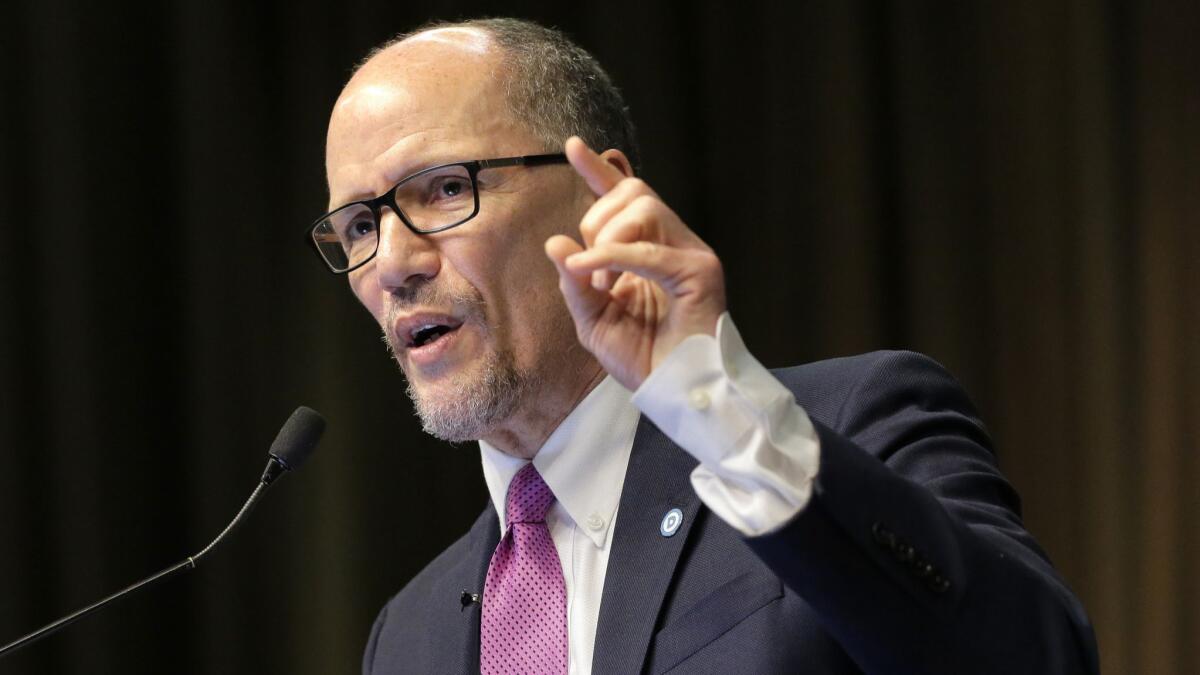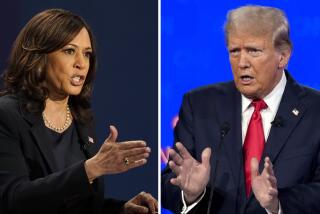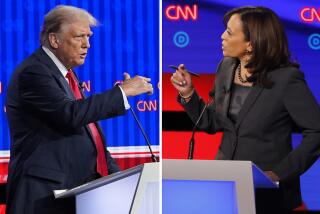Democrats tighten requirements for second round of primary debates

- Share via
Reporting from ATLANTA — The Democratic National Committee is upping the ante for its second round of presidential primary debates, doubling the polling and grass-roots fundraising requirements from its initial summer debates.
The parameters, announced Wednesday, are likely to help cull a crop of 24 candidates and, in the process, intensify scrutiny on Democratic Chairman Tom Perez and his pledge to give all candidates a chance to be heard.
The DNC’s outline for its September debate — the third of at least a dozen promised matchups during the 2020 nominating contest — decrees that candidates can participate only by reaching 2% in four approved polls released between June 28 and Aug. 28 while also collecting contributions from a minimum of 130,000 unique donors before Aug. 28. That donor list must include a minimum of 400 individuals in at least 20 states. The qualifications would remain the same for an October debate, though the party hasn’t set the deadline for measuring fundraising and polling.
About a half-dozen candidates have demonstrated the capacity to hit the new marks with relative ease. Several more are on the fence, and perhaps another dozen face an uphill path. Debate slots are a coveted opportunity for candidates looking to break from the pack, and not being on the stage could be the death knell for a struggling campaign.
ABC and Univision will host the Sept. 12 debate, with a second night if necessary to accommodate the qualified candidates. The September debate site hasn’t been settled. Neither the date nor location is set for October.
The first debates are June 26-27 in Miami. The second set of debates is on July 30-31 in Detroit. Those first rounds carry a polling threshold of 1% and a fundraising mark of 65,000 donors with a minimum of 200 in at least 20 states.
‘How are you going to pay for it?’ — 2020 candidates wrestle with their costly plans »
Perez has yet to lock in the number of slots for either post-Labor Day debate, but the outline hints at the possibility of significantly fewer than the June and July capacity of 20 candidates.
In its announcement, the party states that the second September night would be held only if necessary. When unveiling summer debate plans earlier this year, party officials offered a nominal hedge yet openly predicted they’d fill most if not all of the 20 slots. They went so far as to explain a series of tie-breakers if more than 20 candidates qualified.
As the race stands, the top of the field likely would not be threatened by upping the threshold. That includes former Vice President Joe Biden; Sens. Bernie Sanders of Vermont, Kamala Harris of California and Elizabeth Warren of Massachusetts; former Rep. Beto O’Rourke of Texas; and Mayor Pete Buttigieg of South Bend, Ind.
However, the other candidates, including more senators and several governors, remain jumbled at or near the lower thresholds set for the first two debates.
What’s in a name? When you’re running for president, a lot »
Perez has from the outset of debate planning promised an open, fair process, acknowledging the criticism leveled at the DNC during the 2016 primary process, marred by allegations that then-Chairwoman Debbie Wasserman-Schultz and other party officials favored Hillary Clinton over Sanders.
Perez has pledged to give all candidates a voice while championing the grass roots of the left that has flourished since President Trump’s election. That grass-roots energy was the impetus behind the fundraising metrics, which were developed in consultation with ActBlue, the left’s online fundraising clearinghouse that is helping DNC certify candidates’ fundraising measures.
Who’s running for president and who’s not »
More to Read
Get the L.A. Times Politics newsletter
Deeply reported insights into legislation, politics and policy from Sacramento, Washington and beyond. In your inbox twice per week.
You may occasionally receive promotional content from the Los Angeles Times.










